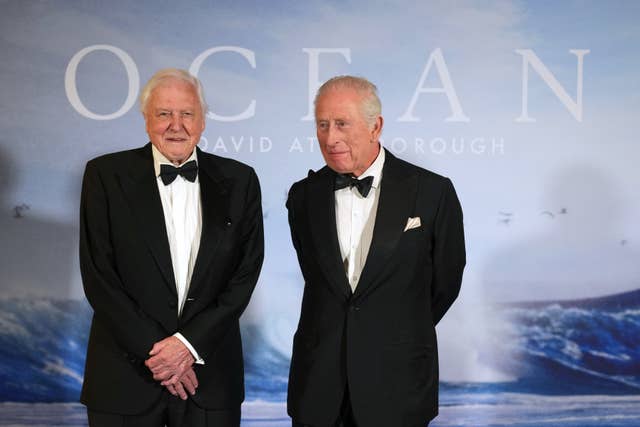Ratify ocean treaty and ban destructive fishing in protected areas, PM urged
The call from heads of UK environmental charities follows Sir David Attenborough’s new film on the oceans, released to mark his 99th birthday.

The Prime Minister is being urged to take “decisive action” to protect the seas in the wake of Sir David Attenborough’s new film on the oceans.
The heads of Greenpeace UK, Oceana UK and Blue Marine Foundation have written to Sir Keir Starmer urging him to prioritise ratifying the Global Ocean Treaty to conserve the high seas and help protect 30% of the world’s oceans.
And he must implement a full ban on bottom trawling and other forms of destructive fishing in all UK marine protected areas to deliver conservation efforts domestically, they say.

Ocean with David Attenborough, released in cinemas to mark the renowned naturalist and TV presenter’s 99th birthday, highlights the need to protect nearly a third of the oceans so they can recover from overfishing and habitat destruction, secure food for billions of people and tackle climate change.
The film includes dramatic footage of the devastation fishing practices such as bottom trawling wreak on the seabed and its wildlife, including before and after footage of scallop dredging off Scotland’s Isle of Arran.
And in one sequence the camera follows a bottom trawl – where nets are dragged with a metal beam across the seabed to catch fish – as it travels over the ocean floor, destroying the habitat, stirring up silt which releases carbon, and scooping up species indiscriminately.
But the film, narrated by Sir David, also offers a message of hope that if protected from damage such as intensive and destructive fishing, the oceans can recover, and backs the call to protect 30% of the world’s marine areas by 2030, known as 30X30.
In the letter to the PM, the conservationists point to the footage in the film and say: “Britain’s marine life is under huge threat from bottom trawling, the most destructive form of fishing, that has had a devastating impact on marine ecosystems in UK domestic waters for decades.
“Fully banning bottom trawling in English MPAs (marine protected areas) would mean these areas could recover and tangibly deliver on our 30×30 goal in practice, not just on paper,” they urge.
The letter to the PM from Will McCallum, co-executive director of Greenpeace UK, Hugo Tagholm, executive director of Oceana UK and Clare Brook, chief executive of Blue Marine Foundation, comes ahead of a key UN ocean conference in France next month.
The letter argues the conference is a “key opportunity for the UK to be a global leader on ocean protection”.
And the conservationists point towards Foreign Secretary David Lammy’s speech eight months ago in which he said the UK was “completely committed” to ratifying the high seas treaty, as part of global efforts on 30X30.
But no parliamentary progress on ratifying the treaty has been made, and continued delay “risks embarrassment” at the conference, as well as the opportunity to have a voice and proactively shape the deal’s implementation, they argue.
They urge the PM: “The story we tell about the world’s ocean could be very different by the end of this Parliament if you and the Government seize on opportunities now to push for and implement real marine protection, both here in the UK and across the world.
“As Sir David says, ‘The ocean can recover faster than we can ever imagine: it can bounce back to life’ and you have a chance to be part of that recovery.
“Act now to ban catastrophic practices like bottom trawling from UK waters and around the world, and ensure we have the protection the world’s ocean needs,” the conservationists write.





